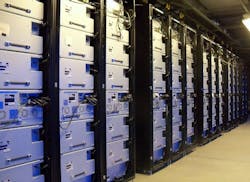Last year we brought you inside Facebook’s data center to see its Blu-Ray cold storage system, a new way to manage the flood of incoming data from Facebook users, who upload more than 900 million photos every day. Thus far this system is operating in just two data centers, the Facebook facilities in North Carolina and Oregon.
Now Facebook is teaming with Panasonic to make this technology available to data centers everywhere. The commercial version of Blu-Ray cold storage, known as Freeze Ray Optical Data Archiver, is designed to provide a new alternative for companies seeking to store massive amounts of data in long-term storage archives.
“We think this solution will be very attractive to the data center industry,” said Yasu Enokido, President of Panasonic’s AVC Networks Company, who introduced the product last week at CSE 2016 in Las Vegas. “We plan to make these optical disc archivers an industry standard.”
The main selling point for Freeze Ray will be the ability to lower the cost of data archiving, as Blur-Ray disc offer considerable energy savings – which is what intially attracted Facebook to the technology.
Facebook might be unique in the scale of its storage operation, but its not alone in the need to think big when it comes to data storage. With a proliferation of technologies that generate “big data,” more companies will begin to see their archiving requirements scale to the point that they start to look like Facebook.
Slashing Costs for Long-Term Storage
Blu-Ray is an optical data storage format that uses blue lasers to read a disk. It is best known as a medium for video players and gaming systems like the PlayStation and Xbox One, as the discs can store large amounts of data.
It’s not useful for primary storage, since data can’t be retrieved instantly. But using Blu-Ray disks offers savings of up to 50 percent compared with the first generation of Facebook’s cold storage design, since the Blu-Ray cabinet only uses energy when it is writing data during the initial data “burn,” and doesn’t use energy when it is idle.
Last June we saw the system in action at Facebook’s data center in Forest City, North Carolina, where the company operates one of its cold storage facilities for long-term storage of user photos.
The Blu-Ray system stored five units per Open Rack, each housing carousels filled with Blu-Ray disks. When data must be accessed, the action happens in the rear of the unit. That’s where the robotic retrieval system has been condensed into a space in the bottom of the rack. When it springs into action, the arm travels along tracks on either side of the rack, fetches a Blu-Ray disk, pulls data off the disc and writes it to a live server.
BluRay cold storage devices inside a Facebook data center. (Photo: Rich Miller)
Facebook’s work with Blu-Ray provided an opportunity for Panasonic, a company with a long history of success in the consumer electronics market which is now pursuing a “B2B transformation.” The data center product fits well with this shift in focus to enterprise IT customers.
Panasonic contributed the optical discs, drives, related robotics and library software to control the system in the data center. Facebook provided its unique expertise in deploying data center storage systems at massive scale.
Even Larger Capacity on the Way
The companies have been working on two generations of the freeze-ray solution. Facebook is deploying the first-generation 100 GB Blu-ray Disc-based archive system into its data centers now, and expects deployment of the second-generation 300GB Archival Disc-based archive system later in 2016.
“We’re seeing exponential growth in the number of photos and videos being uploaded to Facebook,” said Jason Taylor, VP of Infrastructure for Facebook. “The work we’ve done with Panasonic is exciting because optical storage introduces a medium that is immutable, which helps ensure that people have long-term access to their digital memories.”
Both companies plan to continue to collaborate in the study of and eventual development of next- generation systems utilizing higher densities of 500 GB-and oneterabyte Archival Discs to realize a multi petabyte cold storage archive system that will provide even greater benefits to the data center industry.
Panasonic isn’t alone in seeking to commercialize the use of Blu-Ray discs for data center archiving. Last year Sony acquired Optical Archive, a storage startup founded by former Facebook hardware executive Frank Frankovsky.
About the Author


